Wood mulch, wood chip, and bark mulch are the favorite products of home gardeners and landscapers (and professionals, too!).
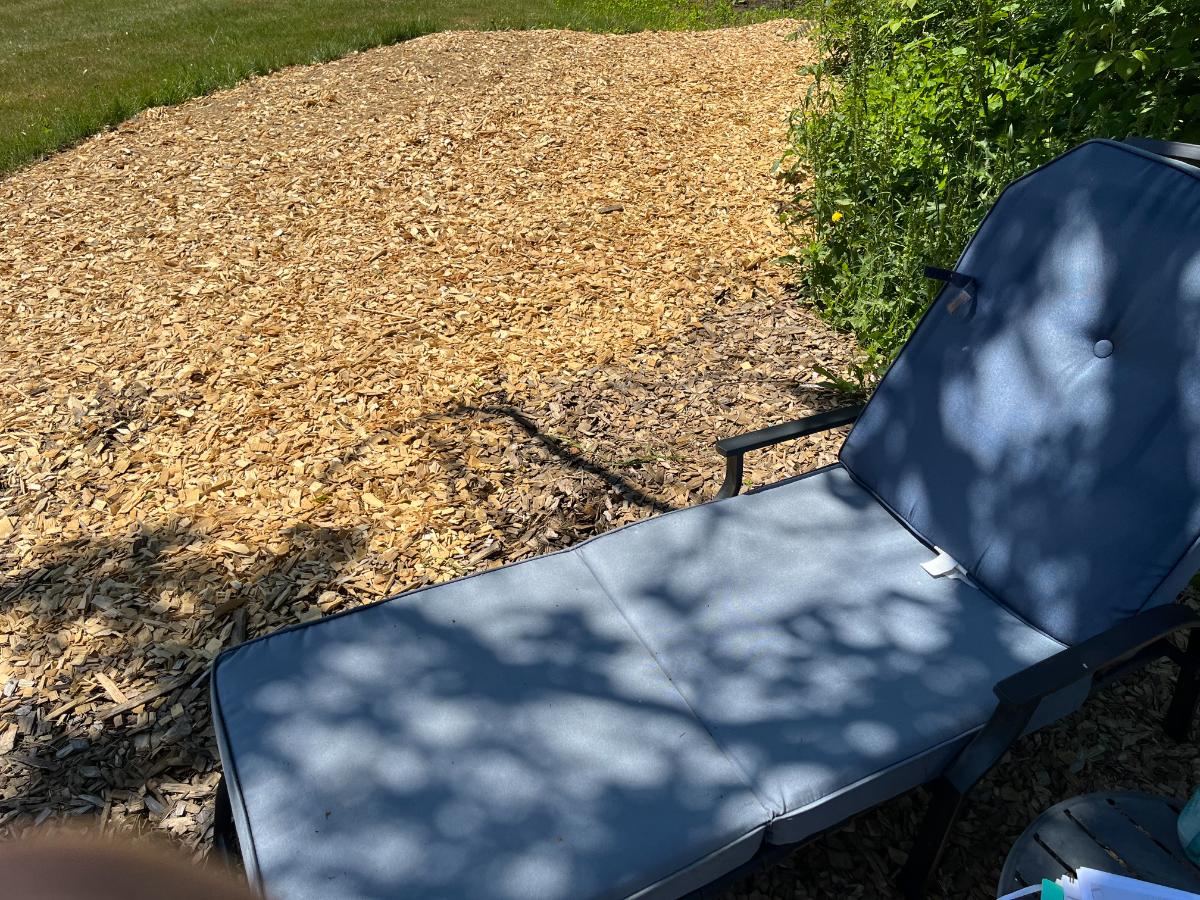
Wood mulch and chip products are economical workhorses for gardens and landscapes. They serve many purposes.
But they have a drawback, too. Wood chip products are prone to attracting and housing ants.
Jump to:
- Ants in Wood Chip and Mulch are a Nuisance and often (but not always) a Problem
- Some common ant problems in gardens, landscapes, and mulched beds
- A good way to ruin the perfect picnic, evening meal, or relaxation spot
- Ant threats to homes and buildings
- There Are Good Reasons to Control Ants in Wood Mulch – and Safe Ways to Do It!
- 1. Cinnamon
- 2. Vinegar
- 3. Mint
- 4. Red Pepper (Or Black or Chili Powder)
- 5. Boiling Water on Ant Hills
- 6. Diatomaceous Earth (DE)
- 7. Neem Oil
- Send Ants on the Run and Enjoy Your Yard and Garden Again!
Ants in Wood Chip and Mulch are a Nuisance and often (but not always) a Problem
Ants are not always a problem in the garden; in some cases, they can carry soil nutrients to plant roots and increase soil aeration.
Some ants help pollinate plants and feed on nectar, which might help prevent plants from being eaten by more harmful pests.
Other types of ants can cause a lot of damage in gardens where you might have wood mulch laid.
Some common ant problems in gardens, landscapes, and mulched beds

- Carpenter ants can infest woody shrubs and trees and start hollowing them out, leading to the death of the tree
- Ants can also destroy garden structures and support systems like stakes and trellises
- Some types of ants will feed on vegetable plants
- Leafcutter ants can strip plants almost entirely of their foliage, resulting in plant death
- Fire ants swarm and have venomous bites – this is painful and can be a problem when you are working in your garden areas or sitting in garden seating and picnicking areas
- Some plants are prone to being eaten by ants, including corn, watermelon, seeds, grains, and others
- Even if they leave your plants mostly alone, ants can reconfigure the soil of your garden, building (sometimes large) unsightly nests and hills
- Too much mining of soil at plant roots can cause problems for your plants
- Ants can make it difficult and uncomfortable to work in your gardens
A good way to ruin the perfect picnic, evening meal, or relaxation spot
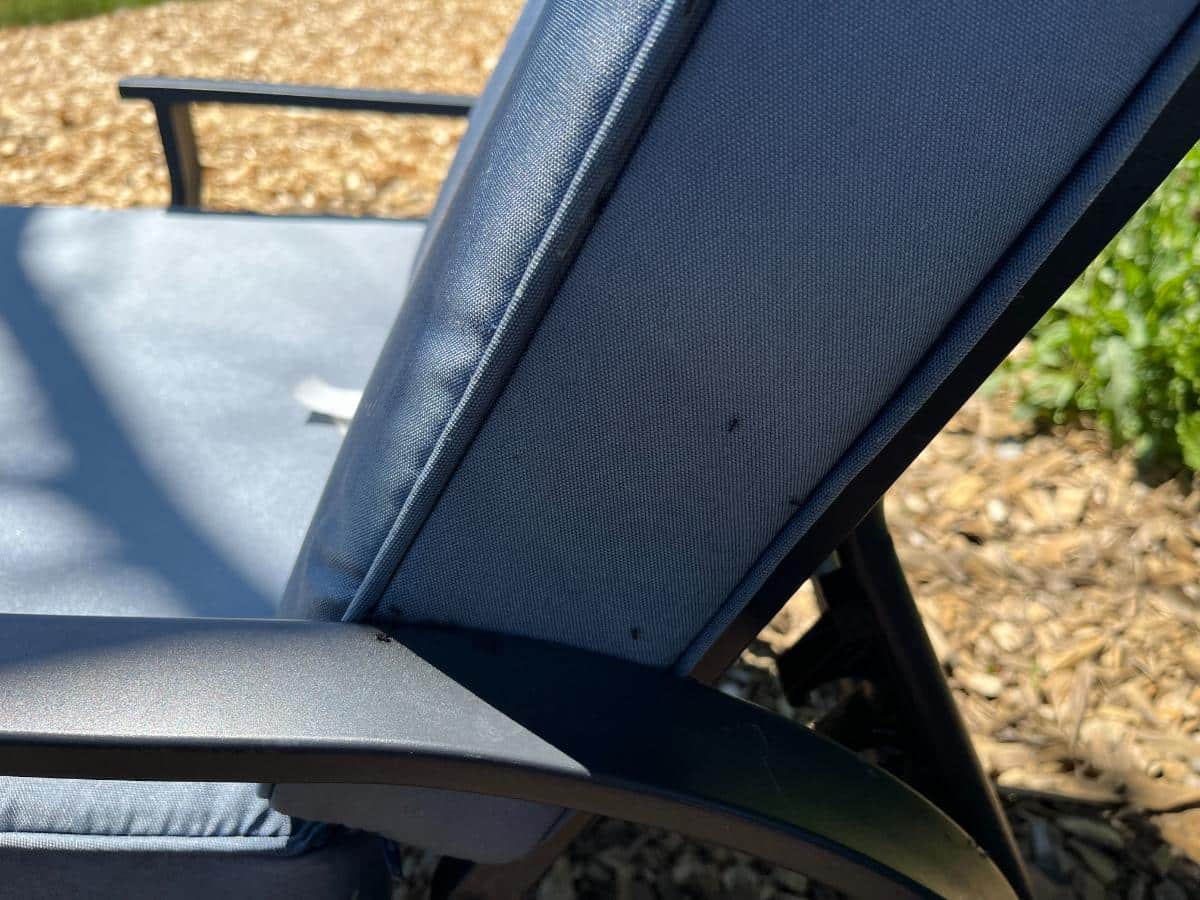
In picnic and seating areas, ants can certainly be a problem, swarming to food sources and ruining your relaxing meals.
If they find food and resources there, they are bound to come back time and again and build nests where they are finding what they need.
Where there is one ant, there are countless many. Ants leave pheromone trails for others to follow to these resources.
Again, fire ants can be a big problem in seating areas. Bites are painful to anyone, but some people can be allergic to ant bites, too. Not a fun way to relax!
Ant threats to homes and buildings
One other problem that ants present in mulched beds and landscapes is the threat to your home and buildings.
Carpenter ants are destructive in wood structures. Other ants will run to kitchens, where they can become a constant problem on counters and in food and pantry staples.
Wood mulch and wood chips are often used in flower beds, landscape features, and gardens around houses and buildings. If ants set up shop there, the house is often the next step.
Heavy rains will frequently drive ants in when their homes are flooded and food gets scarce outside. Ants can become particularly bad inside in a rainy year or season.
There Are Good Reasons to Control Ants in Wood Mulch – and Safe Ways to Do It!
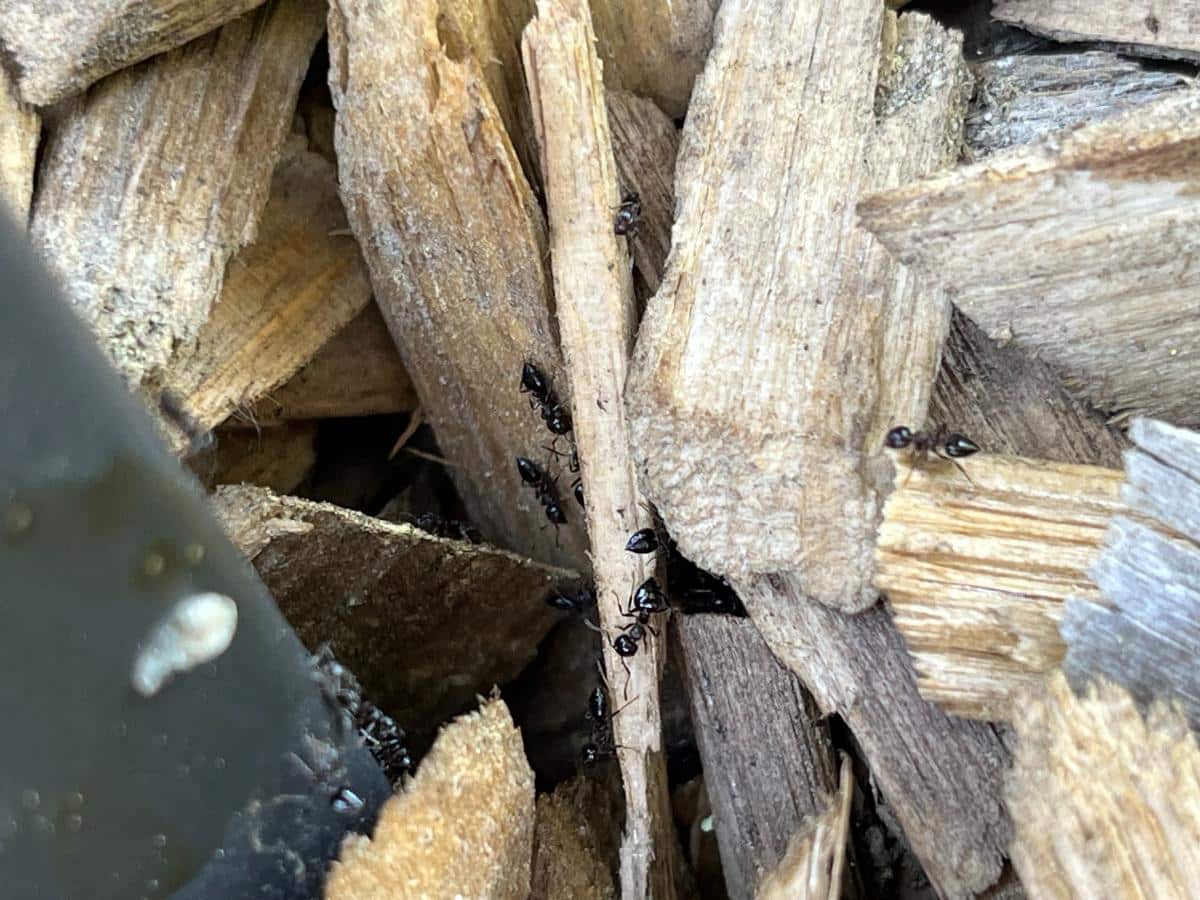
All of these reasons are good reasons to want to control or repel ants in your mulched beds, gardens, and picnic and seating areas.
Fortunately, controlling ants naturally is not too hard. You can do it without resorting to harmful chemical pesticides that present a threat to pollinators and beneficial insects or to you, your family, or your pets!
Here are seven of our favorite ways to simply, easily, economically, and safely control ants in wood mulch:
1. Cinnamon
Ants hate cinnamon. To us, it’s a nice savory spice with a bit of a bite, but to ants, it is seriously off-putting.
Using cinnamon is a trick that a lot of beekeepers use around honeybee hives. They spread ground cinnamon in a perimeter around and under their hives. The ants won’t want to cross the cinnamon, and they’ll move elsewhere.
You can use the same concept to keep ants out of your mulch. Buy cheap ground cinnamon, then spread it over and around the areas you want to keep ants out of.
You’ll probably need to cover a sizable space, so buying a big bulk bottle from online or a warehouse food club is probably the cheapest way to go.
Advantages of using cinnamon to deter ants:
- Economical
- Safe for people, pollinators, and pets
- Deters rather than poisons
- Has a scent that is pleasant to people
- Will stay in place and work for several weeks
2. Vinegar
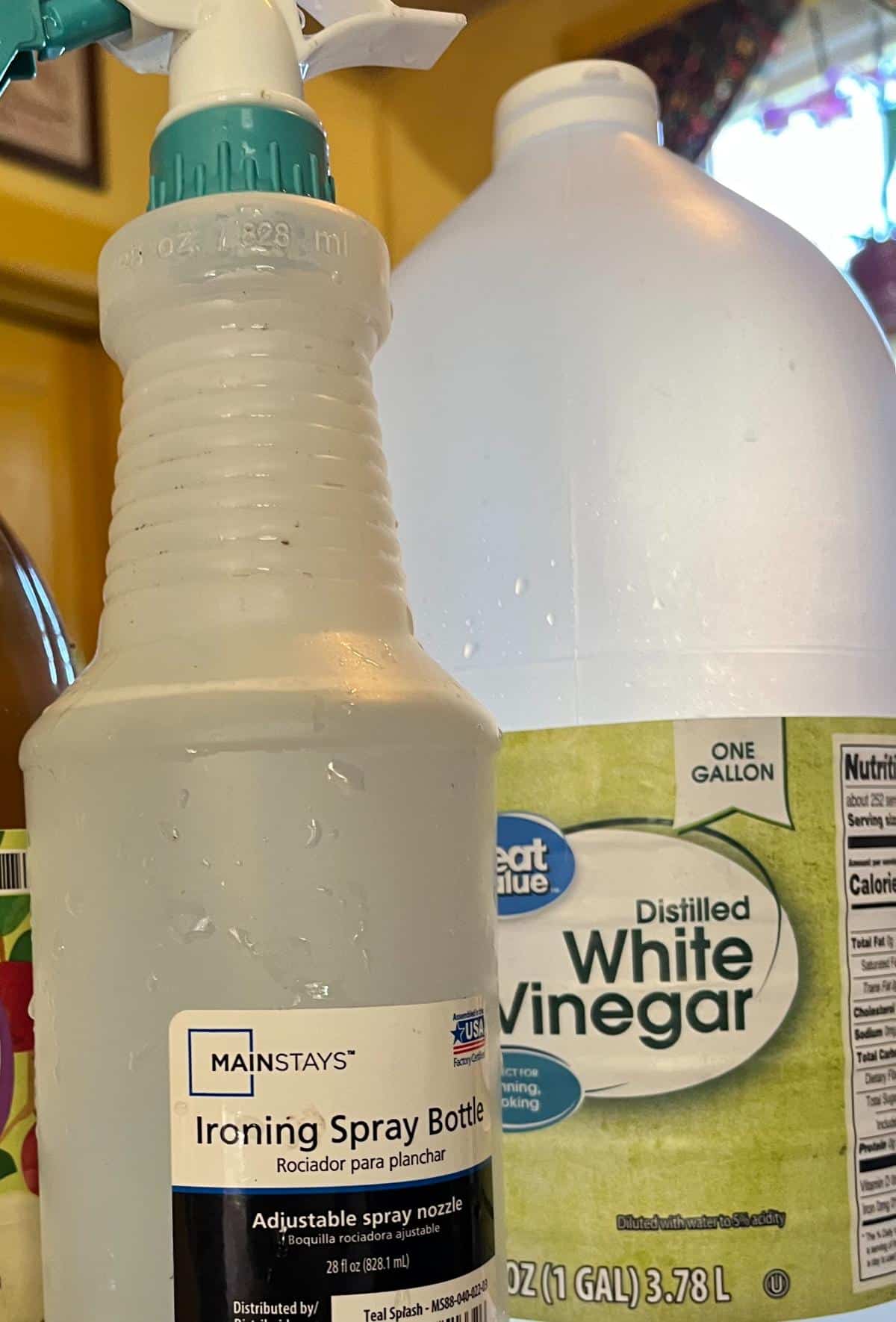
Use any household vinegar to repel and kill ants. Simple, basic white vinegar is recommended, and it’s cheap.
Mix the vinegar with water in a one-to-one part mixture.
Vinegar can be used as ant control in a few ways:
- Sprayed directly on ants, it will kill them
- The vinegar masks the pheromone trails that ants follow to food sources, so it will stop the trail of ant travelers when they can’t find where to go
- The smell of the vinegar alone is repellant to ants
Vinegar and water can be used as a repelling spray over the chips and on the legs and surfaces of furniture. It makes an excellent natural cleaner with antiseptic properties, too. Even when you can’t smell the vinegar anymore, the ants can, and it will continue to repel them.
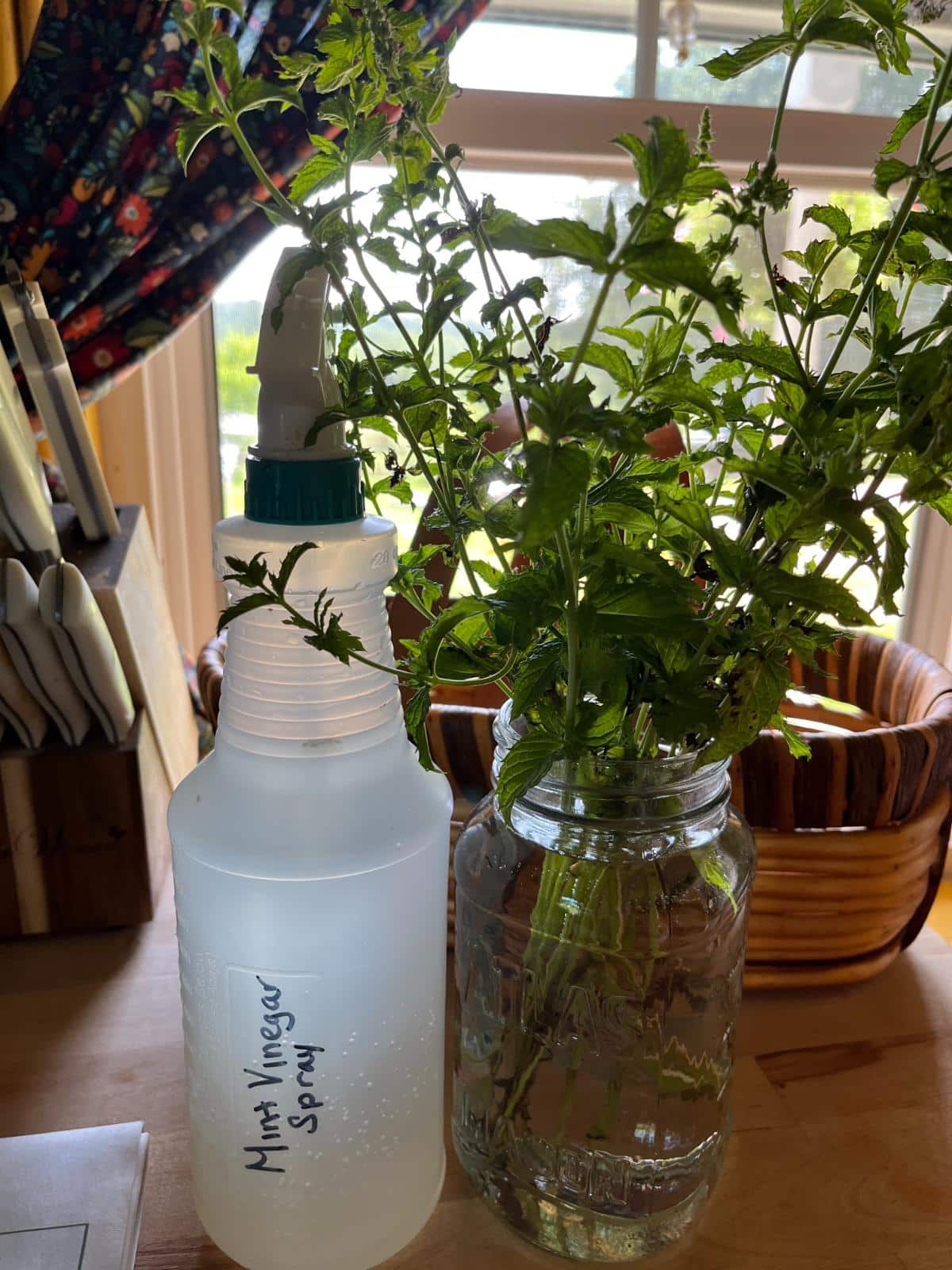
Keep a bottle of the spray on hand. It can be used as an ant killer, too – all safe, all natural, food safe for eating surfaces and eating areas, and the residual will help repel ants and send them elsewhere.
You will need to reapply the vinegar as needed, especially after rain.
Vinegar can damage and kill plants (it’s often used as a natural home weed killer), so take care when you’re applying it.
Make sure you don’t accidentally overspray or let vinegar drift onto plants.
Vinegar can only harm plants and foliage it touches, so careful spraying or covering plants with a sheet or bucket as you spray the area will protect them.
Advantages of using vinegar to deter ants:
- Cheap and easy
- Safe for people and pets
- Is also a natural cleaner and disinfectant
- Easy to keep on hand
- The scent dissipates for humans but not for ants
- Can affordably cover large areas with a couple of gallons of generic white vinegar
3. Mint

Ants hate mint. Fortunately, if you grow mint, you’re bound to have a lot of it!
Mint works primarily as a deterrent and an ant repellent.
There are several ways you can use mint to get rid of ants in and around gardens, landscapes, and seating or eating areas:
- Dry the mint (it dries quickly in warm air), then crush or crumble it and spread it around the affected areas
- Spread dry sprigs of mint over your mulch areas or anywhere you want to keep the ants away
- You can simply lay out fresh-cut sprigs, and they will dry where they lay
- Use live mint plants
- Plant a border of mint around areas
- If you’re concerned about mint spreading too much, plant the mint in pots and set the pots around the area
- Use potted mint plants or vases of mint sprigs in water on picnic and side tables
- Infuse water with mint sprigs for a cheap and easy, nice-smelling ant-repelling spray
- If you don’t have mint plants, you can also use mint essential oil (and if you want a stronger mint water infusion, you can add drops to that, too)
- Use about 20 drops of mint essential oil in a one-quart spray bottle (it’s fine to use more – it will just be a stronger smell!)
Combine mint and vinegar and put the power of mint and vinegar together in this simple homemade cleaning and ant-repelling Mint Vinegar Spray.
Want to learn more about growing your own mint? Check out this guide: How to Propagate Mint 3 Ways + Helpful Growing Tips
Advantages of using mint to deter ants:
- Cheap
- Easy
- Easy to grow
- Works well as part of the garden area or landscape
- Smells nice
- Is a food and a plant that can do double-duty
- Is safe for people and pets
- Multiple ways to use it to repel ants (inside and out)
- Attractive looking, too!
- Many varieties to choose from
- Works well with other repellants, like vinegar and others
4. Red Pepper (Or Black or Chili Powder)
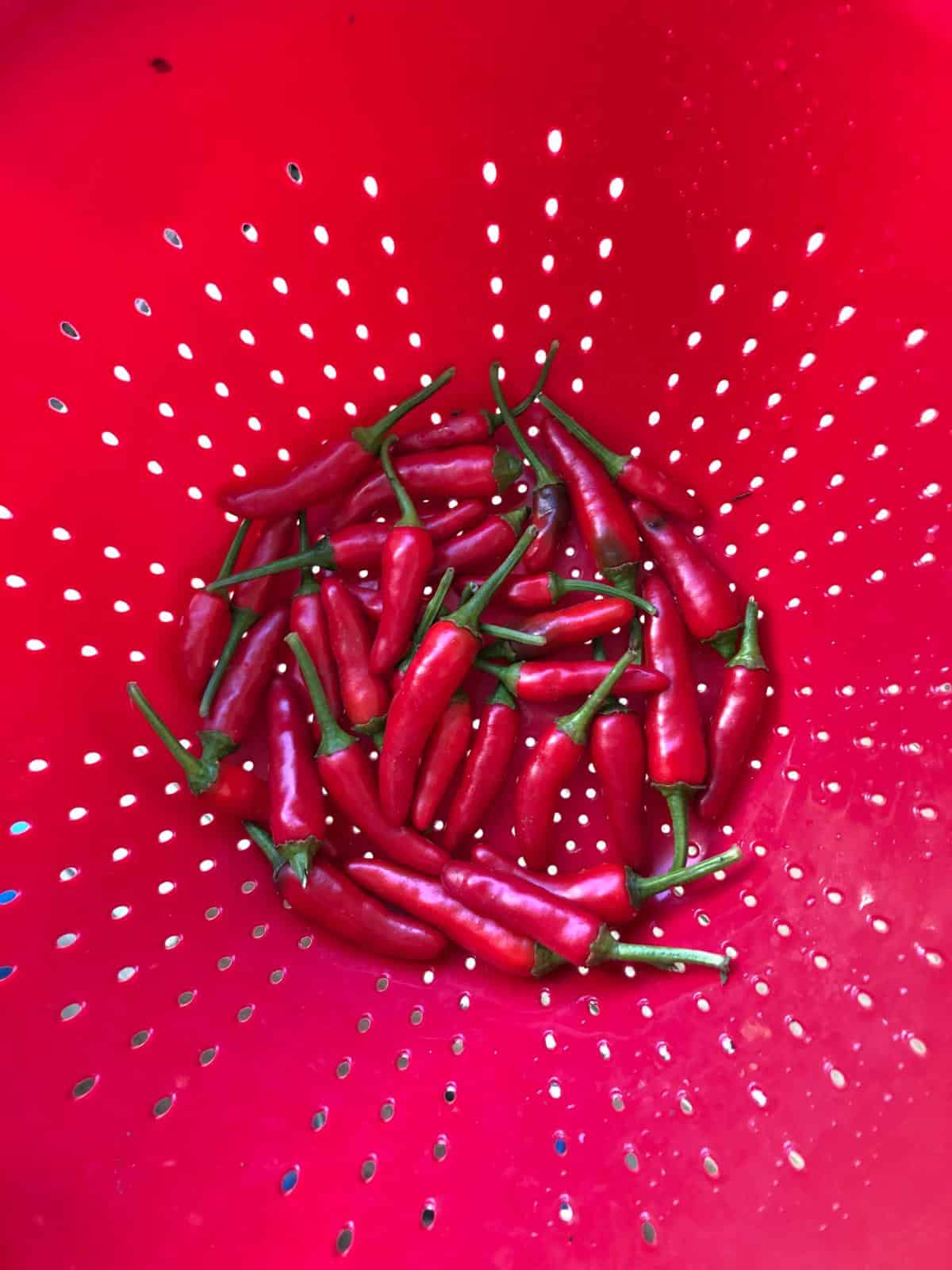
Anything pepper – especially hot pepper – is a deterrent for ants.
There are a few different ways you can use pepper to deter ants:
- Sprinkle ground or crushed pepper as a powder-type repellent over the wood chips
- Make a repelling spray by putting ¼ cup ground pepper in warm water, then spray that where needed
You can use fresh peppers to make an anti-ant spray, too:
- Pour boiling water over hot peppers
- Let it cool, and then strain the peppers out and put the spray in a spray bottle
- Spray the mixture anywhere you need to deter ants
- You can also pour the mixture around furniture legs or use it as a ground pour-on
Advantages of using pepper to deter ants:
- Easy to use as spray or powder
- Easy to mix sprays
- Cheap
- Is food, so it’s safe for use around pets and people
- Lasting, residual effects
5. Boiling Water on Ant Hills
This has got to be the cheapest and simplest solution for ants in wood chips.
Just boil water and pour it over the ant hills. It will kill the ants and eggs and send any survivors looking for somewhere new to set up home.
Be mindful of plastic or plastic-based weed barriers if you have them underneath your wood chips or wood mulch. Boiling water will melt holes all the way through plastic weed barriers, and then you’ll lose the weed-blocking capabilities of your barrier.
It won’t have a lasting effect, but boiling water is fast-acting.
Advantages of using boiling water to deter ants:
- Free
- Easy
- Fast-acting, immediate results
6. Diatomaceous Earth (DE)
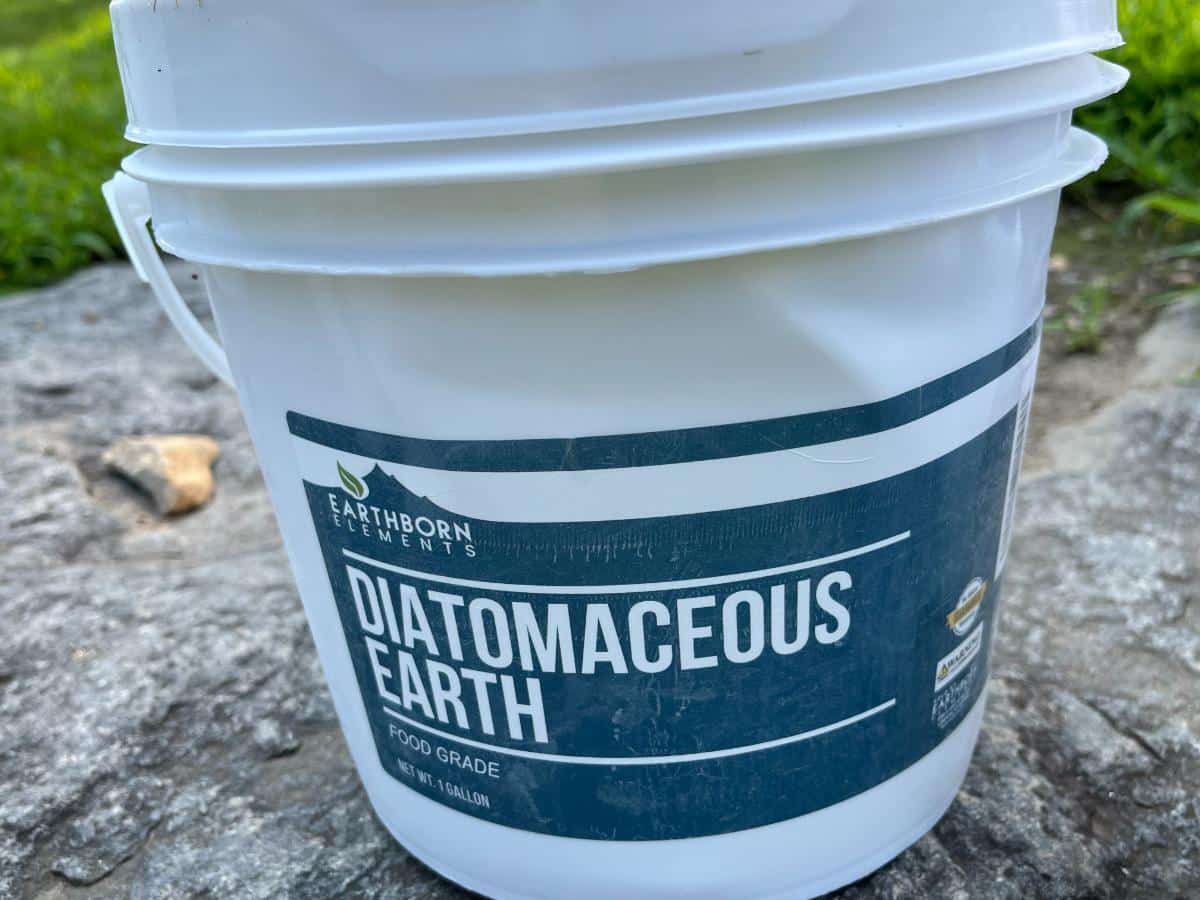
Diatomaceous Earth is made up of the fossilized remains of tiny aquatic diatom skeletons. They are mostly made up of silica.
Diatomaceous Earth (DE) is a natural, organic product. It works as an insect killer on insects that have exoskeletons. This includes ants.
The way DE works is by cutting tiny cuts in the skeletons of the insects, which then causes them to dehydrate and die.
Diatomaceous Earth is safe for pets and people (in fact, there is a “food grade” version, which is what you usually find even in farm and garden stores). It is a fine white powder. You should read the label directions for any recommended precautions.
To apply, you sprinkle the DE over the surface of the wood chips. If you don’t like the look of it, you can rake the chips around to sift it through.
It isn’t good to inhale too much DE, so take some care when you apply it. Apply on a wind-free day so it goes where you want it to.
One drawback of diatomaceous earth is that it is not effective when wet. However, even if it rains, the DE will dry out again and its ant-killing power will be restored.
Safe use of DE around pollinators and beneficial bugs
Diatomaceous Earth is also safe to use on plants and in the garden. There is some risk to pollinators and beneficial beetles and insects.
It is best not to apply DE on flowers or on plants where beneficial insects are doing the job for you. A bit of research and heeding label instructions will help you avoid negative side effects on good bugs.
However, bees and beneficial insects are not very likely to crawl around on wood chips because there won’t be a food source for them there, so it’s fairly safe to use on wood mulch and chips.
The things bees and beneficial insects would be going for are nectar, pollen, or insects that they might feed on, and that is not something the wood chips would have on the chip itself.
Advantages of using Diatomaceous Earth to deter ants:
- Inexpensive
- Has a lasting effect
- Will work again after rain
- Easy to apply
- Safe for pets, children, and people
- Safe for beneficial insects if you avoid areas where they feed
- Good product to have on hand for different garden uses
7. Neem Oil
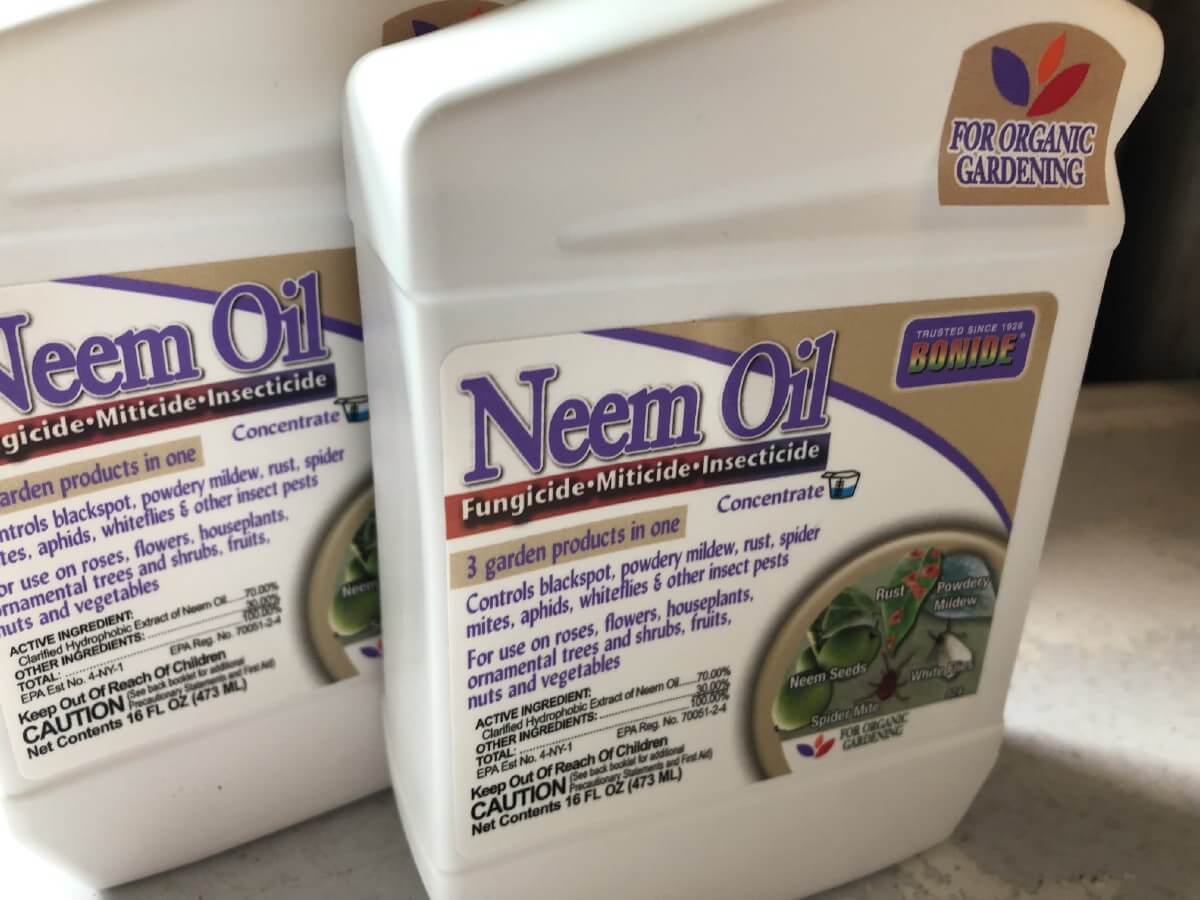
Neem oil both repels and kills ants.
As an ant killer, neem oil smothers the ants and causes them to die. Used in this way, the neem oil has to be sprayed directly on the insect to kill it.
Once it is dry, neem oil won’t kill the ants unless they ingest it. That’s a little harder to achieve, but it helps if you apply the neem on plants.
Neem oil is an excellent organic, natural all-around plant and garden protector. (But do be aware that it can have negative impacts on beneficial insects and pollinators, too – avoid spraying on blossoms and flowers for this reason).
If you have plants around your mulched spaces or in mulched gardens, and they have insects like aphids that are feeding on those plants, the Neem can do double-duty, help kill the aphids and also kill ants that farm the aphids.
Dry neem oil can kill aphids because the aphids will eat the dry neem when they suck on the plants. Then, the ants can become poisoned enough to negatively impact them and reduce their numbers.
When the ants ingest the honeydew from the aphids as a food source, the ingested neem reduces feeding and disrupts the ants’ hormonal cycles, impacting reproduction. Ants will often drag aphids off to their nests to feed the nest, which impacts the whole nest.
Neem does have a smell to it, which lessens as it dries but might be noticeable to you for a few days. Ants will detect it for longer and it can act as a simple repellent, even if the ants don’t end up being sprayed by it or ingesting it.
So, there are several ways in which neem oil can be used in wood mulch and wood chips to help control the ants.
Neem oil is an organic product derived from the oil pressed from the seeds of the Neem tree. It's natural.
If you are using neem to kill or repel ants, the less diluted it is, the better. If you have a large area of wood chips to spray, you may need to dilute it in water to disperse it.
Dilute according to package directions. If different concentrations are offered on the label, go with a higher concentration.
Advantages of using Neem Oil to deter ants:
- Not the cheapest, but still affordable
- Good multi-purpose garden product
- Widely available online and in farm and garden stores
- Doesn't expire, so it’s easy to keep on hand
- Safe when used according to label directions to protect beneficial insects and pollinators
- Safe for pets and people (though there are some precautions that are recommended when applying)
- Highly effective
- Works as both an ant killer and repellent
- Won't harm plants if over-sprayed or if it drifts when sprayed
Send Ants on the Run and Enjoy Your Yard and Garden Again!
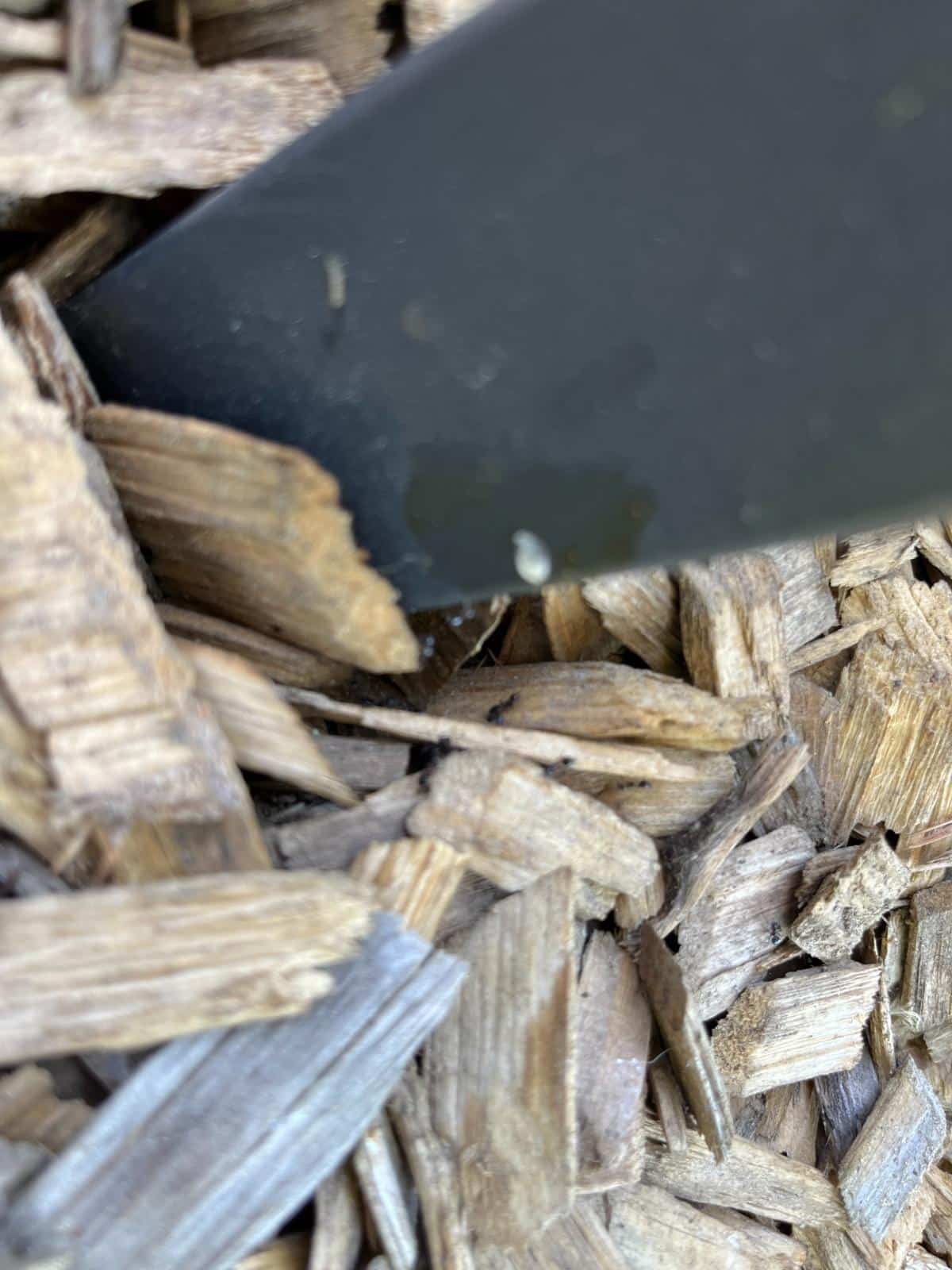
With these seven simple products, you have a range of effective, safe, useful products to eliminate or repel ants in your garden, landscape, around your home and buildings, and in seating, eating, and picnicking areas.
When you’re done treating to get ants out of your mulch or wood chip, don’t forget to take some time to sit back, relax, and enjoy!

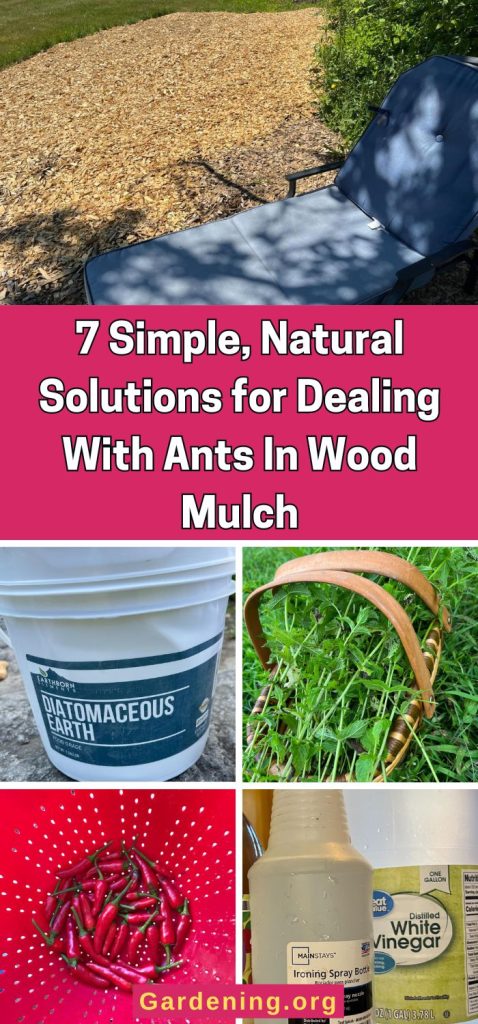
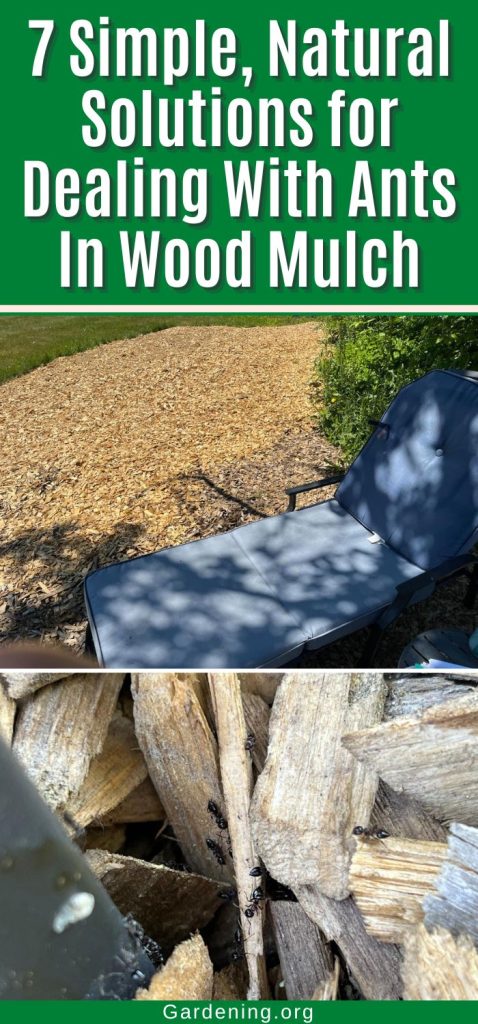
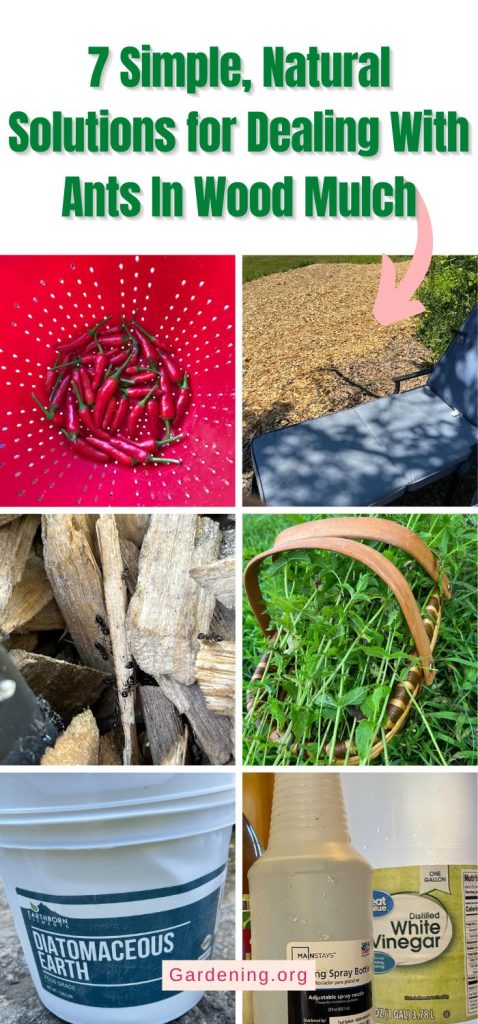
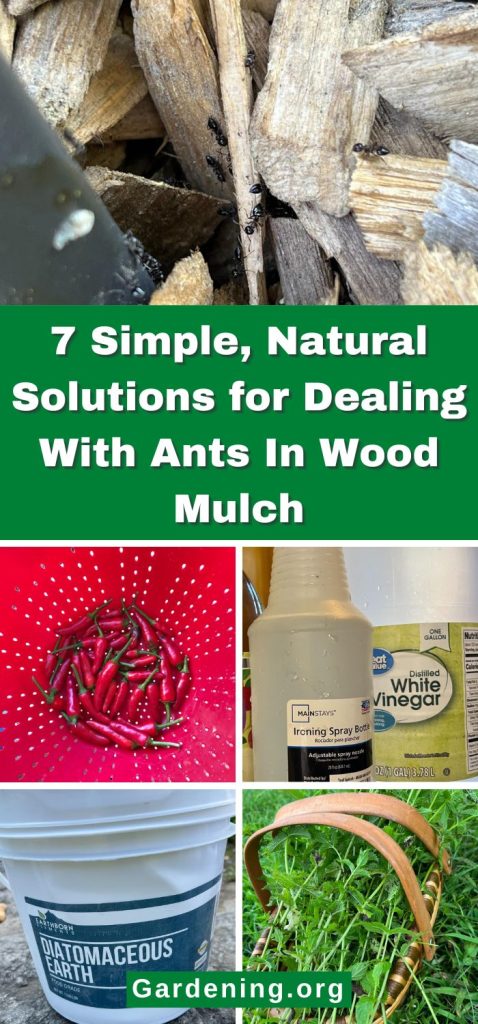
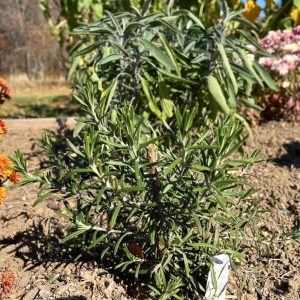
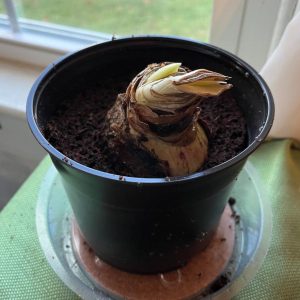
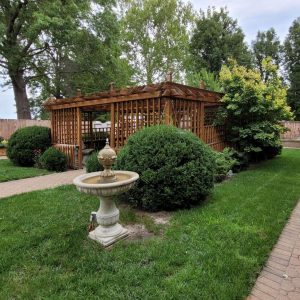
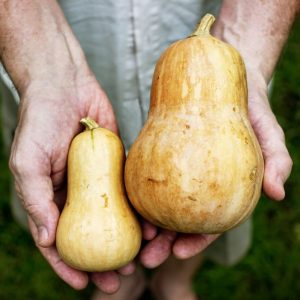
Leave a Reply